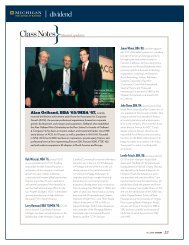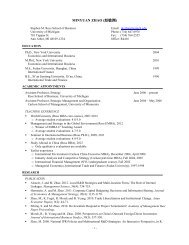DIvIDEnD - Stephen M. Ross School of Business - University of ...
DIvIDEnD - Stephen M. Ross School of Business - University of ...
DIvIDEnD - Stephen M. Ross School of Business - University of ...
You also want an ePaper? Increase the reach of your titles
YUMPU automatically turns print PDFs into web optimized ePapers that Google loves.
photo by scott stewart<br />
a:<br />
It’s summer 2005 in Baghdad. capt. Sherman<br />
Powell, MBA ’09, is commanding a company <strong>of</strong><br />
264 troops in the u.S. Army’s 1st Battalion, 64th<br />
Armored Regiment. And he’s losing sleep.<br />
It’s not because <strong>of</strong> the persistent insurgents.<br />
Powell and his troops have trained for those and are<br />
well-prepared to meet the enemy. What’s keeping<br />
him awake is the $42 million in military equipment under<br />
his control. That’s more than 10,000 items. And<br />
while the Army has a computerized inventory system,<br />
it doesn’t extend to small units in the field. Powell’s<br />
only tool is an archaic paper-and-pencil system.<br />
“i saw right away that the hardest part <strong>of</strong> the mission wasn’t<br />
going to be fighting the enemy,” Powell says. “it was keeping track<br />
<strong>of</strong> our equipment. i had 14 binders full <strong>of</strong> paper.”<br />
accounting for inventory might have been the supply sergeant’s<br />
job, but it was Powell’s responsibility. he’d seen one <strong>of</strong>ficer’s<br />
military career ruined because <strong>of</strong> a missing cargo truck, and he<br />
wasn’t going to lose his own command over an errant piece <strong>of</strong><br />
gear. so Powell developed a simple click-and-drag computer program<br />
to assign equipment to his lieutenants and sergeants. they<br />
could confirm by logging on each day and accepting. everybody in<br />
the company could track each tank, truck, rifle, machine gun, flak<br />
jacket, and pencil.<br />
EnliSTinG THE TRooPS the system quickly gained traction<br />
through word <strong>of</strong> mouth. “with everything the military has to<br />
worry about, nobody ever took the time to simplify the inventory<br />
management system or extend it to the bottom <strong>of</strong> the organization,”<br />
Powell says. “it just took <strong>of</strong>f on its own.”<br />
even after he left the service and entered business school, Powell<br />
continued to receive requests to use his system. then, during an<br />
internship at google, he hit upon an idea to monetize the operation.<br />
<strong>of</strong>ficers had been asking if they could order new equipment<br />
through his website. so Powell decided to <strong>of</strong>fer the equipmenttracking<br />
service for free and sell merchandise for pr<strong>of</strong>it.<br />
“i picked up a lot working at google,” he says. “it shows you can<br />
build a successful business by giving away a service for free.”<br />
in his second year at <strong>Ross</strong>, Powell’s team won the michigan <strong>Business</strong><br />
challenge, secured $38,000 in prize money, and <strong>of</strong>ficially<br />
launched the website armyproperty.com. a meeting with Sam Zell,<br />
AB ’63/JD ’66, a founding benefactor <strong>of</strong> the Zell lurie institute<br />
for entrepreneurial studies at <strong>Ross</strong>, led to venture financing from a<br />
fund run by Zell’s company.<br />
suddenly Powell was an entrepreneur. he turned down his<br />
dream job <strong>of</strong>fer from the Boston consulting group to nurture his<br />
startup, which ended 2009 with $650,000 in sales. Powell and his<br />
team aim to double that figure in 2010.<br />
“i never thought i’d be a sort <strong>of</strong> war pr<strong>of</strong>iteer, but we take pride<br />
in delivering the best value for the government,” he says. the company<br />
has briefed generals at the Pentagon and other top <strong>of</strong>ficers in<br />
the army materiel command. Powell says the reaction has been<br />
“very, very positive.”<br />
THE ADVAncE armyProperty recently cleared a new front in<br />
the contracting business after a supply <strong>of</strong>ficer in a national guard<br />
unit asked to order 950 camelbak water backpacks through army-<br />
Property. Powell submitted a bid that would net him a pr<strong>of</strong>it, and<br />
waited to see what would happen. two days later he had a contract<br />
for $50,000.<br />
since then armyProperty has been competing with more established<br />
suppliers to win additional bids for military equipment.<br />
Powell believes the fact that he and other members <strong>of</strong> his team are<br />
ex-military personnel lends credibility to their operation.<br />
“Because people are using our system for daily tasks, it’s just as<br />
easy for them to go through us on supply orders instead <strong>of</strong> searching<br />
for another distributor,” he says. “we work hard to make it easy<br />
for them.”<br />
that hard work continues to pay dividends. for example, army-<br />
Property ranked third in a recent bid for an order <strong>of</strong> 650 escapeand-evade<br />
survival backpacks for helicopter crews in Powell’s old<br />
unit. But since the company has such a good relationship with the<br />
contracting <strong>of</strong>ficer, it won the $300,000 deal for the packs and all<br />
their components, which now are being used on a daily basis in<br />
afghanistan.<br />
Powell plans to keep that momentum going to further advance<br />
in the military supply business. he also hopes to pick up some it<br />
work to help simplify other existing, in-house military systems.<br />
“i just want to be the guy who makes life easier for troops on the<br />
ground,” he says. —Terry Kosdrosky<br />
spring 2010 <strong>DIvIDEnD</strong> 41
















